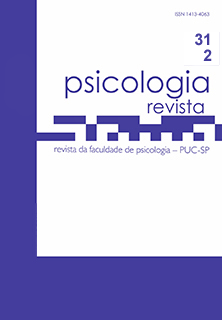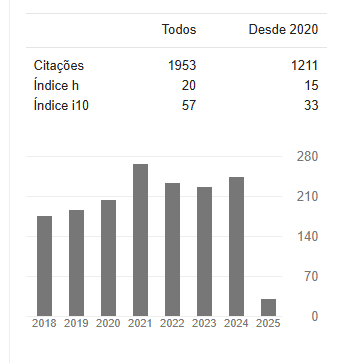Habilidades relacionais para atendimento em saúde
relato de experiência do processo de construção de oficinas práticas
DOI:
https://doi.org/10.23925/2594-3871.2022v31i2p527-543Palavras-chave:
Assistência à Saúde, Comunicação em Saúde, Educação Baseada em CompetênciasResumo
Habilidades relacionais para atuação em campos de trabalho são consideradas competências essenciais que se somam e permitem o processo de aplicação de ferramentas técnicas. Tais habilidades são essenciais em diversos contextos de saúde com potenciais impactos no processo de adesão aos planos de tratamento aplicados. O presente relato tem como objetivo descrever o processo de construção de oficinas práticas voltadas a alunos de cursos da área da saúde visando o desenvolvimento de habilidades relacionais para atendimento clínico. Método: as oficinas abordaram conteúdos relacionados ao desenvolvimento de habilidades de comunicação, postura empática e inteligência emocional enquanto ferramentas de trabalho, assim como resiliência e trabalho em equipe enquanto variáveis componentes do fazer em saúde. Os critérios de avaliação foram: adequação do conteúdo teórico, a capacidade das atividades em operacionalizar as temáticas abordadas e permitir aprendizagem de habilidades de trabalho, a clareza dos materiais de apoio utilizados, as apresentações feitas pelas facilitadoras e possibilidade de indicação das oficinas a colegas. De forma geral os participantes indicaram satisfação com o trabalho entregue. O trabalho proporcionou aos estudantes oportunidades de aprendizagem de forma a construir conhecimento e desenvolver habilidades relacionais de trabalho pertinentes à realidade das atividades clínicas e buscou aproximar os estudantes de um contexto real de atuação.
Referências
Arnold, E. C., & Boggs, K. U. (2016). Interpersonal Relationships: Professional Communication Skills for Nurses. St. Louis, MO: Elsevier
Back, A. L., Fromme, E. K., & Meier, D. E. (2019). Training Clinicians with Communication Skills Needed to Match Medical Treatments to Patient Values. Journal of American Geriatrics Society, 67(2), 435-441. doi: 10.1111/jgs.15709
Bonvicini, K. A., Perlin, M. J., Bylund, C. L., Carroll, G., Rouse, R. A., & Goldstein, M. G. (2009). Impact of communication training on physician expression of empathy in patient encounters. Patient Education and Counseling, 75(1), 3-10. doi: 10.1016/j.pec.2008.09.007
Chichirez, C. M., & Purcarea, V. L. (2018). Interpersonal communication in healthcare. Journal of Medicine and Life, 11(2), 119-122.
Davis, M. H. (1980). A Multidimensional Approach to Individual Differences in Empathy. JSAS Catalog of Selected Documents in Psychology, 10, 85.
Denniston, C., Molloy, E., Nestel, D., Woodward-Kron, R., & Keating, J. L. (2017) Learning outcomes for communication skills across the health professions: a systematic literature review and qualitative synthesis. BMJ Open, 7(4), e014570. doi: 10.1136/bmjopen-2016-014570.
Dibbelt, S., Schaidhammer, M., Fleischer, C., & Greitemann, B. (2009). Patient-doctor interaction in rehabilitation: the relationship between perceived interaction quality and long-term treatment results. Patient Education and Counseling, 76(3), 328-35. doi: 10.1016/j.pec.2009.07.031
Frankel, R. M., & Stein, T. (2001). Getting the most out of the clinical encounter: the four habits model. Journal of Medical Practice Management, 16(4), 184-91.
Hatcher, R. L., Fouad, N. A., Grus, C. L., Campbell, L. F., McCutcheon, S. R., & Leahy, K. L. (2013). Competency benchmarks: practical steps toward a culture of competence. Training and Education in Professional Psychology, 7(2), 84–91. doi: 10.1037/a0029401
Helitzer, D. L., Lanoue, M., Wilson, B., de Hernandez, B. U., Warner, T., & Roter, D. (2011). A randomized controlled trial of communication training with primary care providers to improve patient-centeredness and health risk communication. Patient Education and Counseling, 82(1), 21-9. doi: 10.1016/j.pec.2010.01.021
Institute of Medicine (IOM). (2001). Crossing the Quality Chasm. A New Health System for the 21st Century. Washington, DC: National Academy Press
Kelm, Z., Womer, J., Walter, J. K., & Feudtner, C. (2014). Interventions to cultivate physician empathy: a systematic review. BMC Medical Education, 14, 219. doi: 10.1186/1472-6920-14-219
King, A., & Hoppe, R. B. (2013). “Best practice” for patient-centered communication: a narrative review. Journal of Graduate Medical Education, 5(3), 385-93. doi: 10.4300/JGME-D-13-00072.1
Kreps, G. L. (2014). Evaluating health communication programs to enhance health care and health promotion. Journal of Health Communication, 19(12), 1449-59. doi: 10.1080/10810730.2014.954080
Okun, B. F., & Kantrowitz, R. E. (2014). Effective Helping: Interviewing and Counseling Techniques. Boston, Ma: Cengage Learning
Park, M., Giap, T. T., Lee. M., Jeong, H., Jeong, M., & Go, Y. (2018). Patient- and family-centered care interventions for improving the quality of health care: A review of systematic reviews. International Journal of Nursing Studies, 87, 69-83. doi: 10.1016/j.ijnurstu.2018.07.006
Pun, J. K. H., Chan, E. A, Wang, S., & Slade, D. (2018). Health professional-patient communication practices in East Asia: An integrative review of an emerging field of research and practice in Hong Kong, South Korea, Japan, Taiwan, and Mainland China. Patient Education and Counseling, 101(7), 1193-1206. doi: 10.1016/j.pec.2018.01.018]
Ruben, B. D. Communication Theory and Health Communication Practice: The More Things Change, the More They Stay the Same. (2016). Health Communication, 31(1), 1-11. doi: 10.1080/10410236.2014.923086
Stensrud, T. L., Gulbrandsen, P., Mjaaland, T. A., Skretting, S., & Finset, A. (2014). Improving communication in general practice when mental health issues appear: piloting a set of six evidence-based skills. Patient and Educational Counseling, 95(1), 69-75. doi: 10.1016/j.pec.2013.12.005
Weisz, E., Ong, D. C., Carlson, R. W., & Zaki, J. (2020). Building empathy through motivation-based interventions. Emotion. Advance online publication. doi: 10.1037/emo0000929
Zaki, J., & Cikara, M. (2015). Addressing empathic failures. Current Directions in Psychological Science, 24(6), 471–476. doi: 10.1177/0963721415599978
Zill, J. M., Scholl, I., Härter, M., & Dirmaier, J. (2015). Which Dimensions of Patient-Centeredness Matter? - Results of a Web-Based Expert Delphi Survey. PLoS ONE 10(11), e0141978. doi:10.1371/journal.pone.0141978
Downloads
Publicado
Como Citar
Edição
Seção
Licença
Copyright (c) 2022 Erika Pizziolo Monteiro, Luana Dullius, Eduardo Remor

Este trabalho está licenciado sob uma licença Creative Commons Attribution 4.0 International License.














